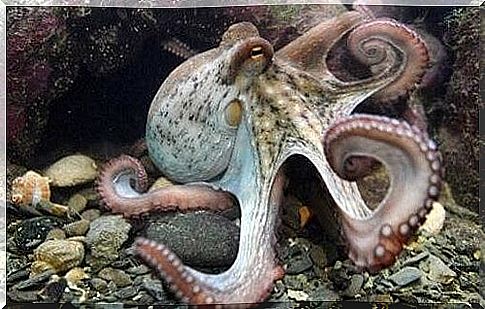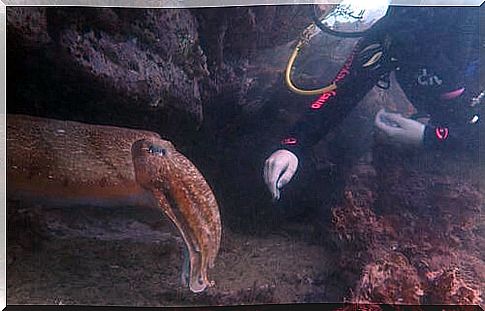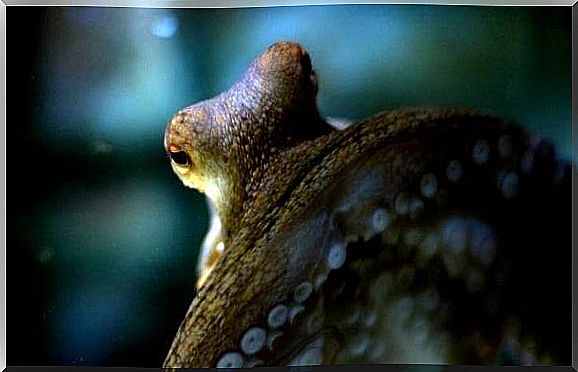The Intelligence Of Octopuses: A Fascinating Mystery

The intelligence of octopuses is increasingly attracting the interest of scientists. These creatures, halfway between “ocean aliens” and brains equipped with suckers, have an amazing mind.
The more than five hundred million neurons possessed by cephalopods are found in their tentacles and with them they explore, feel, smell and even make decisions.
Those who work in aquariums or oceanographers know that the most problematic animals are often octopuses. Those in charge of these infrastructures often tell fascinating stories about how the aforementioned animals devise clever tricks to escape or sneak into nearby tanks and steal food from other marine species. They are extremely fascinating!
For many scientists, however, the intelligence of octopuses , according to many unusual, is not worthy of note. In fact, it would be about skills that respond to a simple ecological intelligence. In other words, animals develop certain strategies according to the demands of the environment in which they move. Octopuses, therefore, are just animals that find the best way to get food where they are.
However, we report a curious fact. Piero Amodio, a researcher at the University of Padua, recorded a video that went viral in a short time. In it we see an octopus that manages to retrieve a shell and get under it. Later, the animal keeps it and takes it away with it because it knows that it is its “tool” and that it can be useful to it in the most ingenious ways. We clearly see planning.
The intelligence of octopuses: characteristics and mysteries
More than two hundred and seventy-five million years ago, cephalopods were equipped with an outer shell. This characteristic was used by these animals to defend themselves from their predators, but it had a limit: it hindered the search for food.
Getting rid of this element allowed them to explore their surroundings with greater ease, penetrate tighter holes, gain strength to break shells, rocks and also to hunt with greater precision.
However, not having a shell makes them more vulnerable and it is precisely from this that we owe the fame of great engineers in finding replacement elements with which to protect themselves. The intelligence of octopuses, however, goes far beyond these tasks.
One of the leading experts in this regard is Peter Godfrey-Smith, an Australian philosopher in constant contact with these creatures. His goal is to explore the origin of consciousness through cephalopods.
Like this
it is an interesting and curious work in which it is worth immersing oneself to better understand these beings and, in turn, also part of our essence. In it, Godfrey-Smith tells us about his encounter with a giant squid in Australia, an animal he was not afraid of and instead observed and approached to “caress” it with enormous curiosity. That delicate contact marked him forever.

Octopuses modify their genetic code
A very curious fact. Eli Eisenberg, a researcher at Tel Aviv University, conducted a study on the intelligence of octopuses which allowed him to discover that these animals are capable of “manipulating” their genetic code.
Cephalopods “improve” their nervous system according to the climatic demands of the environment in which they are found. Their organism recombines the ribonucleic acid (RNA), thus sending new proteins to the genes to improve their adaptation. This phenomenon, which humans obtain slowly through evolution, in octopuses is dictated by environmental needs.
The same amount of neurons as in dogs
Octopuses have about five hundred million neurons, the same as a dog. Cephalopods have their nervous system distributed in tentacles, which means they have nine brains : one central and eight peripheral.
Tentacles are certainly an indispensable part of octopus intelligence. With them they explore, smell, taste and even make decisions. In other words, each tentacle can make a specific decision, separate from the others ; however, they work together in harmony and without discrepancies.

The intelligence of octopuses: they communicate, play and are creative
Biologists have found that some octopuses and squid communicate with each other using a system similar to Morse code. Likewise, anyone used to observing octopus behavior knows that these animals are tremendously creative.
They build their hiding places, are able to solve problems creatively, face challenges, remove caps, open boxes, hunt with great originality and, finally, demonstrate human-like conduct.
When they find themselves in a place that is not to their liking, they throw jets of water at humans when they see them. They develop phobias and interests. They have favorite items and hate others, which they do not hesitate to destroy. They are spiteful and develop attachment to those who care for them and hatred for others.
As the philosopher Peter Godfrey-Smith indicates, delving into the intelligence of octopuses also means delving into our consciousness. After all, the mind arose in the sea, the origin of any living form starts from the ocean and, therefore, looking into the eyes of a cephalopod allows us to understand that we share our history with them.









